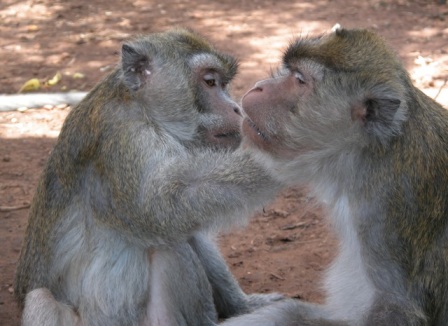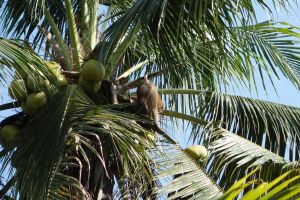Action for Primates

|
Action for Primates |

|
|
The intelligence and manual dexterity of many non-human primates has resulted in their exploitation as 'workers' in different settings. Denied their freedom, these animals are usually deprived of the companionship of other non-human primates and forced to take part in unnatural activities purely to benefit people.
'Helping' hands: Monkeys, particularly capuchins, are 'trained' to help disabled people with various tasks (King 2016). In virtually all cases, the monkey is deprived of not only a natural environment, but also the companionship of others of their kind. In some cases, as often happens with captive non-human primates, the monkeys will become a danger to the person (Taggart 2010). The American Veterinary Medical Association, the largest veterinary medical organisation worldwide, is opposed to the use of non-human primates as 'service' or assistance
animals because of welfare and public health concerns (AVMA 2022). Further, non-human primates are not recognised as "service animals" under the Americans with Disabilities Act (US Department of Justice 2020).
'Waiters: Japanese macaques (Macaca fuscata) are used as 'waiters' as a means of attracting customers in Japan (Anon 2017; McTraveller 2016). The monkeys are forced to wear costumes, such as a waiter's shirt and skirt, and serve beer to guests and carry out other tasks. The animals are forced to walk on their hind legs. This 'bipedal walking' is normally used by these macaques over short distances. Forced, continuous locomotion in this manner, however, is not natural and might lead to joint and muscle damage.

Picking coconuts: Macaques, northern pig-tailed Macaca leonina) or southern pig-tailed (Macaca nemestrina), are used to 'pick' coconuts in Malaysia and Thailand (Barclay 2015; Ruslin et al 2017). The macaques appear to be largely wild-caught (Smith-Squire 2015; Wongsamuth 2015). An investigation carried out in 2020, and updated in 2022, exposed the mistreatment and abuse of captive pig-tailed macaques, kept chained in terrible conditions and forced to climb trees and pick coconuts (PeTA 2022). Another study demonstrated the welfare of the macaques was not good (Schowe et al 2021). The public are not supportive of using monkeys to pick coconuts (Anon 2020).
Detonating landmines: The government of Morocco purportedly had trained monkeys, possibly Barbary macaques (Macaca sylvanus), to detonate landmines (Anon 2003a). It was reported that Morocco offered the US forces a large number of these monkeys, to use them for detonating land mines planted by the Iraqis (Anon 2003b).
The severe deprivation and cruelty towards the monkeys is untenable. In all these situations, other than detonating land mines, the obvious alternative is to utilise the services of people. It is widely known that unemployment is a major worldwide issue for people, resulting in severe poverty. Rather than exploit and inflict suffering on non-human primates, it would be far better, even if one's interest was just people, to provide jobs in the various service fields.
Other alternatives for providing care for disabled individuals include sophisticated mechanical devices such as the care-providing robotic system FRIEND (Functional Robot arm with user-frIENdly interface for Disabled people), a semi-autonomous robot designed to support disabled and elderly people in their daily life activities (Wikipedia 2016).
There are alternatives to using non-human primates (and other non-human animals) for finding and neutralising landmines, such as mechanical mine clearing machines (Wikipedia 2020).
The AVMA does not support the use of nonhuman primates as assistance animals because of animal welfare concerns, the potential for serious injury, and zoonotic risks.
This is the extraordinary Japanese restaurant where monkeys serve drinks and wait tables. The Kayabukiya Tavern, in Utsunomiya, Tochigi prefecture, has been employing macaques for 29 years...
But humans are exceptionally skilled at putting their needs first over other animals'. With these primate cousins of ours, we alter their lives with a firm eye on human benefits and a reluctance to consider the cost to the capuchins themselves. The greater kindness is to allow monkeys to live their lives as monkeys.
Beginning on March 15, 2011, only dogs are recognized as service animals under titles II and III of the ADA.
![]()
![]()
![]()
![]()
![]()
Contact us via E-mail
Copyright © 2020-2026 Action for Primates. All rights reserved.